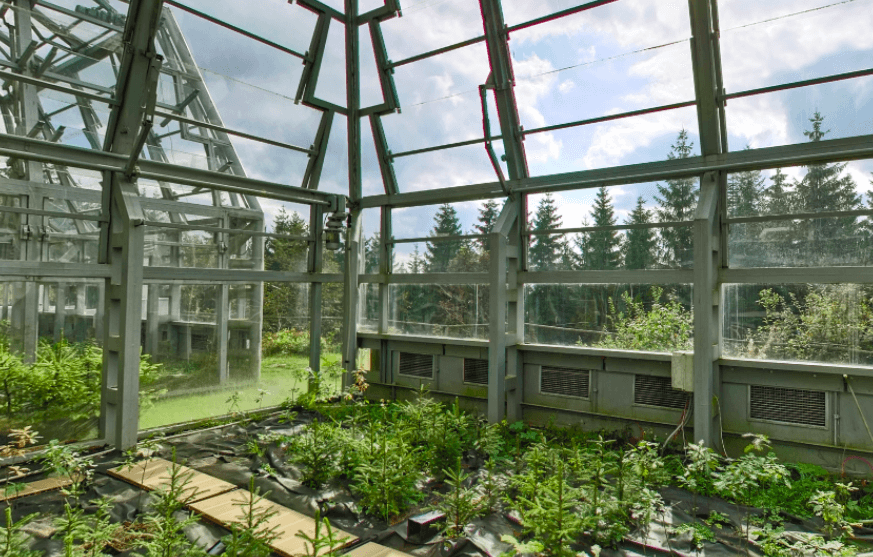RNDr. Jiří Jakubínský, Ph.D. – head
Scientists:
MSc. Ahmed Mohammed Ahmed Alhuseen, Ph.D.
Mgr. et Mgr. Ján Babej, Ph.D.
Ing. Ondřej Cudlín, Ph.D.
doc. RNDr. Pavel Cudlín, CSc.
Mgr. Jan Donoval
RNDr. Magdaléna Edwards , Ph.D.
MSc. Chiranjeewee Khadka, Ph.D.
Ing. Radek Plch, Ph.D.
Ing. Marcela Prokopová, Ph.D.
Ing. Jan Purkyt, Ph.D.
Ing. Pavel Samec, Ph.D.
doc. Mgr. Martin Šlachta, Ph.D.
Mgr. Lenka Štěrbová
Ing. Renata Včeláková, Ph. D.
Ph.D. students:
Ing. Radka Alessia Dante
MSc. Egor Pavlovič Selivanov
Others:
Eliška Harsová
Ing. Filip Holub
Zdeňka Kovaříková
Ing. Vladana Procházková
Dr. Luca Salvati
Motto
Understanding the impacts of human and climate change interactions on landscape ecosystem functioning is essential to proposing effective measures to support them and ensure the irreplaceable benefits they provide.
Research objectives and focus
The team’s goal is to contribute to the recognition of the impact of global change on ecosystem functioning, combining different spatial scales and methodological approaches. In addition to our own original results of basic and applied research, the output also includes scientifically based proposals for mitigation and adaptation measures to reduce these impacts.
Our research interests include:
- analysis and modelling of selected ecosystem functions and exploration of the energy-substance balance of ecosystems in terms of their importance under conditions of ongoing climate and environmental change;
- identification of stressors of river landscapes and proposals for procedures to assess and improve their ecological status and prevent the occurrence of hydrological extremes;
- investigation of forest ecosystems responses to environmental change at the ecosystem and landscape scales.
From a methodological point of view, in studying the basic segments of global change impacts (atmosphere and climate, ecosystems, socioeconomic systems), we focus primarily on analysing the interactions between all three segments. The main methodological approach is the development of models and other tools to study ecosystem functions and services in the context of indirect and direct drivers (mainly climate change and land use).
Key words: ecosystem functions/services, environmental modelling, river landscapes, ecological status of water bodies, carbon sequestration, climate change impacts on forest ecosystems
The main research directions of the department:
Analysis of the effects of climate and environmental change on the performance of selected ecosystem functions as a background for ecosystem service assessment
- Development of the integrated model “IMALBES” (Integrated Modelling and Assessment of Landscape, Biodiversity and Ecosystem Services) in cooperation with the Department of Geoinformatics, Palacký University in Olomouc
- Exploration of the changing relationship between diversity (taxonomic, functional and species diversity in response to environmental change) and selected ecosystem functions (production, evapotranspiration and water and substance retention) in the landscape
- Determination of ecosystem function of water and substance retention using water runoff, soil erosion, and deposition models
- Development of the methods and tools for assessing the hydromorphological and ecological status and ecosystem functions of rivers, riparian zones, and floodplains
- Study of natural pollinators of orchards and agricultural crops under the influence of climate change
- Assessment of the sustainability of natural resources in agriculture and forestry in terms of energy, carbon and economic balance, including the evaluation of environmental impacts, using the Life Cycle Assessment (LCA) method




Analysis of forest ecosystem response to environmental change
- Retrospective analysis and prediction of forest ecosystem response to environmental change (primarily drought and atmospheric deposition with emphasis on ozone)
- Estimation of the impact of the potential decay of forest stands with a predominance of spruce on the carbon balance of forest and forest-agricultural landscapes
- Investigation the possibilities of using the EFISCEN growth model (including the YASSO soil model) for the above two objectives
- The study of underground ecosystem processes in forest ecosystems – the effect of natural disturbances (e.g., bark calamity) on the rhizosphere, particularly ectomycorrhizal fungal (ECM) communities.



Current research grants:
- Development of the methodology for monitoring and assessing the hydromorphological characteristics of watercourses – „HYMOS“ (2022–2024, Technology Agency of the Czech Republic, Grant No. SS05010135)
- Importance and protection of floodplains as an environment for the performance of the landscape ecostabilisation function – „NIVA“ (2022–2024, Technology Agency of the Czech Republic, Grant No. SS05010134)
- Evaluation of hazard-mitigating hybrid infrastructure under climate change scenarios (2023–2025, Czech Science Foundation, Grant No. 23-04520L)
Applied research results:
RipaSoft – web application for automated assessment of the ecological status of riparian zones of watercourses (available at www.imalbes.cz)
ESAI (Environmental Sensitivity Assessment Index) – a conceptual model for assessing an area’s vulnerability to degradation, i.e., loss of ability to perform ecosystem functions and provide ecosystem services.
Habitat Assessment Methodology AOPK CR 2017 (Seják, J., Cudlín, P. et al. 2018)
Methodology for assessing the ecological status of riparian zones of watercourses – RHQI (Jakubínský, J. et al. 2020)
Methodology for supporting solitary bee populations in agroecosystems (Šlachta, M. et al. 2021)
- Selected applied outputs are published on the website imalbes.cz, developed within the long-term cooperation of the department with the research team of the Department of Geoinformatics of Palacký University in Olomouc.
Selected publications of the last period
Jakubínský, J.; Krásná, K.; Prokopová, M.; Cudlín, O.; Purkyt, J.; Štěrbová, L.; Pechanec, V.; Cudlín, P. Assessment of the potential natural status of riparian zones in the Czech Republic. River Research and Application 39(1): 95-107, 2022 (IF 2.78)
Egidi, G.; Quaranta, G.; Rosanna, S.; Salvati, L.; Včeláková, R.; Cudlín, P. Urban sprawl and desertification risk: unraveling the latent nexus in a mediterranean country. Journal of Environmental Planning and Management 65(3): 441-460, 2022 (IF 3.37)
Urbanič, G.; Politti , E.; Rodríguez- González, P. M.; Payne, R.; Schook, D.; Alves, M. H.; Andelkovic, A.; Bruno, D.; Chilikova-Lubomirova, M.; Di Lonardo, S.; Egozi, R.; Garofane Gomez, V.; Gomes Marques, I.; Tánago del, M. G.; Gultekin, Y. S.; Gumiero, B.; Hellsten, S.; Hinkov, G.; Jakubínský, J.; Janssen , P. Riparian Zones- From Policy Neglected to Policy Integrated. Frontiers in Environmental Science 99(10): 1-8, 868527, 2022 (IF 4.58)
Kopáček, J.; Čapek, P.; Choma, M.; Cudlín, P.; Kaňa, J.; Kopáček, M.; Porcal, P.; Šantrůčková, H.; Tahovská , K.; Turek, J. Long-term changes in soil composition in unmanaged central European mountain spruce forests after decreased acidic deposition and a bark beetle outbreak . Catena 1(1): 1-1, Article number 1, 2022 (IF 6.37)
Zapletal, M.; Cudlín, P.; Khadka, C.; Křůmal, K.; Mikuška, P.; Cigánková, H.; Polášek, M. Characteristics and Sources of PAHs, Hopanes, and Elements in PM10 Aerosol in Tulsipur and Charikot (Nepal). Water, Air and Soil Pollution 19(1): 1-21, 486, 2022 (IF 2.98)
Pechanec, V.; Štěrbová, L.; Purkyt, J.; Prokopová, M.; Včeláková, R.; Cudlín, O.; Cudlín, P.; Cienciala, E. Selected Aspects of Carbon Stock Assessment in Aboveground Biomass. Land 2022(11): 1-16, Article number 66, 2022 (IF 3.91)
Samec, P.; Kudělková, R.; Lukeš, P.; Kučera, A.; Cudlín, P. Influence of environmental predispositions on temperate mountain forest damage at different spatial scales during alternating drought and flood periods: case study in Hrubý Jeseník Mts. (Czech Republic). Journal of Mountain Science 19(7): 1931-1944, 2022 (IF 2.37)
Pastor, A. V.; Tzoraki, O.; Bruno, D.; Kaletová, T.; Mendoza-Lera, C.; Alamanos, A.; Brummer, M.; Datry, T.; De Girolamo, A. M.; Jakubínský, J.; Logar, I.; Loures, L.; Ilhéu, M.; Koundouri, P.; Nunes, J. P.; Quintas-Soriano, C.; Sykes, T.; Truchy, A.; Tsani, S.; Jorda-Capdevilla, D. Rethinking ecosystem service indicators for their application to intermittent rivers. Ecological Indicators 137: 108693, 2022 (IF 6.26)
Jakubínský, J.; Prokopová, M.; Raška, P.; Salvati, L.; Bezak, N.; Cudlín, O.; Cudlín, P.; Purkyt, J.; Vezza, P.; Camporeale, C.; Daněk, J.; Pástor, M.; Lepeška, T. Managing floodplains using nature-based solutions to support multiple ecosystem functions and services. Wiley Interdisciplinary Reviews: Water 2021: 1-19, Article number e1545, 2021 (IF 7.43)
Veselá, P.; Vašutová, M.; Edwards-Jonášová, M.; Holub, F.; Fleischer, P.; Cudlín, P. Management After Windstorm Affects the Composition of Ectomycorrhizal Symbionts of Regenerating Trees but Not Their Mycorrhizal Networks. Frontiers in Plant Science 12(641232): 1-11, 2021 (IF 5.75)
Pechanec, V.; Prokopová, M.; Salvati, L.; Cudlín, O.; Procházka, J.; Samec, P.; Včeláková, R.; Cudlín, P. Moving toward the north: A country-level classification of land sensitivity to degradation in Czech Republic. Catena 206: Article number 105567, 2021 (IF 4.33)




